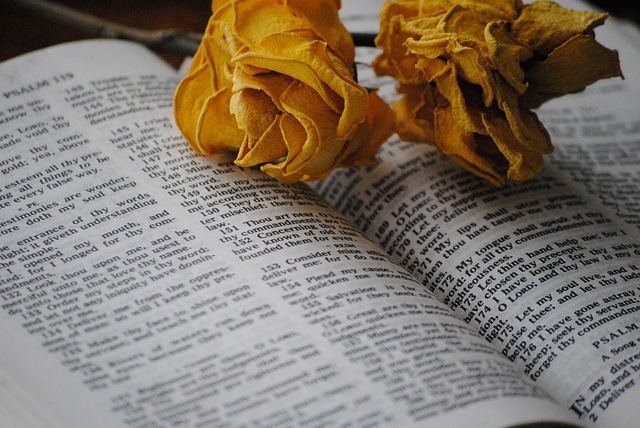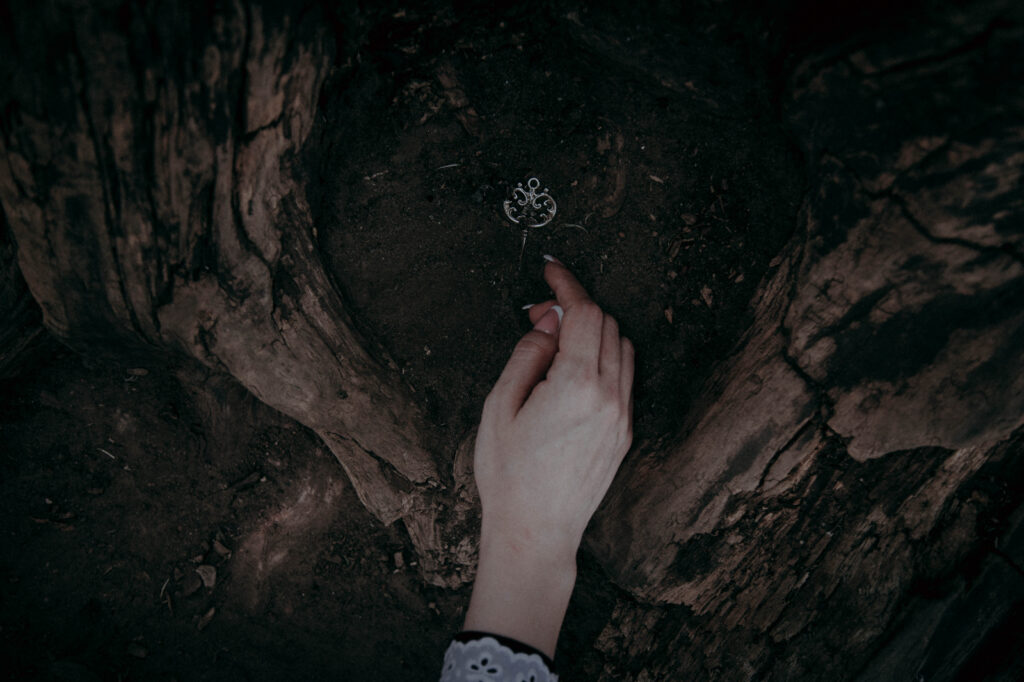Did you know that the Bible, along with other traditionally Christian items like rosaries and icons of Saints and even the Eucharist, have been used in folk magic for centuries? From English Devon folk magic to Italian folk magic, from superstitions and syncretic practices to prayer books such as the Slovenian Kolomonov Žegen, the use of Christian iconography, literature, figures, and holy names (like the name of Jesus Himself) have featured prominently in some of the most potent magical acts and procedures.
When it comes to witchcraft today, though, people traditionally think of a Book of Shadows or a grimoire—a book full of a witch’s spells, information, and good old fashioned trial and error that they’ve accumulated over the years. These books are wonderful treasures as they continue to be filled, full of spells and incantations and prayers created by the practitioner that have been proven to work, and many people write them with the specific intent of passing them on to children or apprentices or other practitioners.
But one often overlooked resource, especially for those looking to reconnect with the folk culture of their ancestors, is none other than the Bible itself. Within it are many different sections that can be used to focus one’s magic, as has been done over the centuries by Christian cunningfolk and other magicians—often with the intent of defending against harmful or evil intentions from other practitioners. And given that so many members of the Abrahamic faiths use actual pieces of scripture in protections (like the Jewish mezzuzah or the different types of wearable amulets with pieces of the Qu’ran inside), the power of the Word of God is acknowledged even among those who have nothing to do with the concept of magic and the Craft.
Of course, it’s strange to think about for many a modern witch–the idea that magic is not only possible, but prolific in religions that seemingly condemn it so harshly—but the reality is that no religion can truly be operated without magic. How else would we interact directly with our God, exorcise evil spirits, or transmute our Eucharist? This is why you might notice a group of Christians calling themselves witches, using the modern idea or witchcraft that spawned thanks to Wicca and 90’s new age spirituality as a type of cultural shorthand to explain the spiritual work we’ve always done.
In fact, the words used to denote witchcraft in the Bible were actually ones that dealt with specifically harmful or foreign magic, which both Abrahamic and other religions had issues with (including Babylonian, Sumerian, Greek, and Roman polytheism). It’s also why you’ll see so much of what we would call witchcraft today in European and Christian folk magic dedicated to warding against witchcraft (like German mothers putting lavender under their children’s beds to protect from evil magic, Slovenian unwitchers doing elaborate prayers and rituals to break curses, or cunningfolk doing counter magic on cheese that allegedly wouldn’t curdle right due to a witch’s curse). When you’re a rural European farmer who can’t afford to wait for a doctor or a priest, the only option is to learn defensive and healing magic for yourself.
I myself am a Christian witch, and I can tell you firsthand: Christian magic is a staple in our ancestors’ interactions with God, especially when tools like the Bible are involved. And, of course, the more of your own folk practice and ancestral traditions you learn, the more unique and inventive the magic gets. As a Christian Witch goes about learning more of their heritage and ancestral practices, however, it’s good to know the basics of using the Bible in witchcraft—so let’s talk about it!

Divination with the Bible (Bibliomancy)
A seasoned witch will tell you that before any spellwork or ritual, it’s wise to do some divination with your guides, whoever they may be.
As a Christian witch, our foremost guide is, naturally, God. And there’s an age-old practice that many Christians might not think of as divination, but absolutely fits the bill, and that’s bibliomancy.
Bibliomancy, as the word suggests, is any sort of information we can gather from a book (any book, not just the Bible). After all, that first part of the word, biblio- shows up in more than just the Bible, right? Think of a bibliography, a list of compiled sources, or a bibliophile, a person who’s really enthusiastic about books. But when it comes to bibliomancy, the Bible is certainly a top contender for the divinatory tool of choice, even if plenty of other interesting books are available on your shelf.
Bibliomancy is simple. Just like shuffling a deck of oracle or tarot cards, you want to really focus on your question and intention. Hold it in your mind even after you ask God, and then open your Bible and flip the pages until you feel compelled to stop. You may feel a sensation like:
- A tingle in your ear or at your fingertips
- A sudden silence in the mind that interrupts your flow & catches your attention
- A heavy feeling in your stomach when you reach a certain section
Whatever your intuitive signs are that you’re used to with other methods of divination, look for that here and fish out a specific part of the page with it. You might find yourself landing on a verse of Scripture, or you may find yourself looking at an insightful footnote you didn’t consider before. Either way, thank God for His attention and HIs message, and decide from there whether or not spellwork is even a good idea that day.

Psalms & Proverbs for Quick Casting
Once you’ve gotten your divination out of the way, the first thing you’ll hear anyone tell you about using the Bible for witchcraft is that the Psalms are insanely overpowered.
And they’re right!
One of the most prime examples of a powerful Psalm is none other than Psalm 109—an imprecatory Psalm, meaning one in which the speaker asks God to incite some serious punishment on whoever did something wrong. My Bible, the Jewish Study Bible, notes that because of its focus on what words were said against the speaker, and the long string of asks that come after pleading their case to God, it’s entirely reasonable to say that this Psalm was actually written as a counter curse.
It’s awfully brutal for a counter curse, I will say. But it is an example of magic you can use through the Bible, especially if you’re looking for quick, pre-written incantations or spells that hit the mark. The Psalms and Proverbs are so varied in their talking points, purposes, and themes that you can find one for pretty much any occasion, and when you read them aloud with the intention of them being a spell—really connecting to God and channeling down His blessings through your own magic—you’ll find it’s like the difference between a static shock from your sweater and a full on lightning blast.
And remember: you don’t have to use an entire Psalm or Proverb (they run quite long!). Sometimes, just a verse or two is enough to get your point across and focus your magic and intention in your spellwork.
Some of my personal favorites include:
- Psalm 147 (for emotional healing & fortification)
- Psalm 146 (anti-gossip and slander)
- Psalm 81, 142 (security & comfort)
- Psalm 39:13-14 (A great opening section for plainly stating a request later)
- Proverbs 1, 8 (Wisdom/Knowledge)
- Proverbs 3:9-12 (Prosperity)
- Proverbs 17 (Peace/Anti-Conflict)
- Proverbs 22 (Softness of Heart against greedy folks)
- Proverbs 31:25 (Empowerment/Anti-Anxiety)

Thematic Rituals and Ingredient Inspiration
Lastly, those who know the Bible well and know the story inside and out will find all kinds of beautiful lessons tucked in between all the raw humanity of this book. Yes, you read that right, and I’ll repeat it again: the Bible, the Word of God, is such an inherently human and vulnerable and raw book, full of tragedy and celebration side by side, just as Life itself is.
But when you know the stories, and you can pull out core lessons, you can actually find a lot of fantastic focusing or centering verses and chapters to build your spells around. I’ve even made amulets with lockets that have a verse number or bit of Scripture tucked inside, along with corresponding herbs and spices and other such things. All of the Psalms and Proverbs I listed have their functions, including anti-anxiety, but they’re not the only ones that can do that!
For instance, one of the most powerful pieces of the Gospel for spellwork is none other than Jesus’s admonishment of his disciples in Matthew 6:25-34:
25 “Therefore I tell you, do not worry about your life, what you will eat or drink; or about your body, what you will wear. Is not life more than food, and the body more than clothes? 26 Look at the birds of the air; they do not sow or reap or store away in barns, and yet your heavenly Father feeds them. Are you not much more valuable than they? 27 Can any one of you by worrying add a single hour to your life?
28 “And why do you worry about clothes? See how the flowers of the field grow. They do not labor or spin. 29 Yet I tell you that not even Solomon in all his splendor was dressed like one of these. 30 If that is how God clothes the grass of the field, which is here today and tomorrow is thrown into the fire, will he not much more clothe you—you of little faith? 31 So do not worry, saying, ‘What shall we eat?’ or ‘What shall we drink?’ or ‘What shall we wear?’ 32 For the pagans run after all these things, and your heavenly Father knows that you need them. 33 But seek first his kingdom and his righteousness, and all these things will be given to you as well. 34 Therefore do not worry about tomorrow, for tomorrow will worry about itself. Each day has enough trouble of its own.
Jesus had a lot of wonderful things to say that can strengthen us even in the darkest of times, and those make for some powerful magic. In fact, it’s Jesus Himself that delivers the secret of Christian magic in the Gospels: faith, even that the size of a mustard seed, can move mountains.
Speaking of the mustard seed, though, now’s also a good time to mention: the Bible has quite a few spots that signify specific stones, incenses, herbs, and spices throughout its stories. Frankincense, after all, isn’t only something offered to Jesus and His family when He’s born; it’s also an integral part of the holy incense of the very Temple of God. And mint, anise or dill (depending on translation), and cumin are among the spices Jesus mentions as being a tithe in Matthew 23:23, too—along with justice, mercy, and faith. When you find mention of herbs, spices, or other abstract concepts like these, pay attention!
They’re significant to God, and when you combine their associations in the Bible (rue and hyssop, for instance, being apotropaic, along with lamb’s blood or cedar), with traditional witchy associations with them, you can get a lot more bang for your buck. Mustard has always meant power and passion thanks to its fiery, Mars-based associations, but combining it with its ability to surprise us with its aggressive growth and its representative qualities regarding faith, it gets all the more important.
You might also take the time to learn from cultural practices that become apparent in places like Leviticus 14, which is a ritual to cure people of leprosy, or in the story of Jesus casting demons into a herd of pigs. Both of these represent the idea of giving an evil spirit or malady somewhere else to attach to (the bird, the pigs) and driving it away from the afflicted person. That’s some powerful banishment and exorcism technique!

Get Creative With the Bible and Max Out Your Spellwork
All in all, like any other magic, what matters with using the Bible in spellwork is how creative you are in applying it. The book contains the hopes, dreams, fervor, and faith of millions of people over the course of thousands of years, and it’s also had the honest energy and belief of millions more poured into it as a sacred object. Even if God’s power weren’t in that book, that alone would make the Bible super powerful as a magical focusing tool and ritual item.
Whatever your intention is, I can almost guarantee you can find a verse to match it, so go wild! And even if you aren’t Christian, chances are that you have ancestors that might’ve been (or who had to use the cover of Christianity to cloak the magical work they did as folk magicians). The Bible is powerful on its own, and there are so many instances of syncretic crossovers in folk magic (such as German folk magic, where many pagan practitioners still incorporate items such as rosaries and Bible verses into their spells and ritual workings). But also remember, that when it comes to Christian Witches, the place our power comes from isn’t a book (even if it is God’s word): it’s God. So when a Christian uses their magic to connect to Him, that’s where the real power lies.
No matter your background, and no matter your beliefs, though, remember to stay safe in your spellcasting, take your proper precautions, and overall just enjoy the moment. Happy witching!







Wow